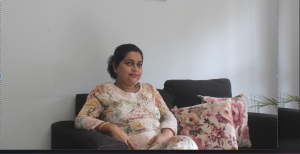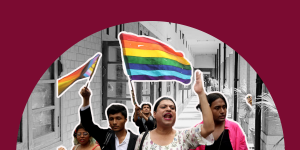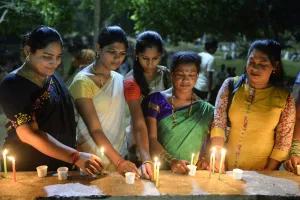India’s New Transgender Portal Is Caught In Red Tape, Apathy and Bias

Roll call is always traumatising for Veronica Tyagi, 19, a trans woman studying zoology at the Lovely Professional University in Phagwara, Punjab. Every time Tyagi responds to the name “Vishal”, listed in the university register, the faculty raises questions. “They ask me baseless questions about my gender. They tell me that ‘Vishal’ is typically a masculine name and how could it be mine because I am not a man. It is disturbing,” said Tyagi, who started transitioning six months ago.
Tyagi will have to keep responding to the dead name of Vishal till she submits her transgender certificate and identity card (TGID) to the university and initiates the process of getting her gender and name changed in its books. She is yet to get these documents though she applied for them a year ago, in April 2021, on the National Portal for Transgender Persons.
Launched by the Ministry of Social Justice and Empowerment (MSJE) in November 2020 the portal is meant to provide trans persons a comprehensive platform for acquiring an ID based on their self-perceived identity, an important provision under the Transgender Persons (Protection of Rights) Act, 2019.
Transgender persons can apply for these documents by uploading a self-attested affidavit declaring their place of residence, self-perceived identity and any one these ID cards – passport, bank passbook, birth certificate, PAN card, Aadhaar card, MGNREGA card or caste certificate. The application is then sent for approval to the district magistrate (DM) who oversees the area that is listed as the applicant’s place of residence.
The DM is required to issue the certificate and ID within 30 days from the receipt of the application, as per rules. But we found that this rarely happens.
There are 4,87,803 transgender persons in India, according to the 2011 Census, which activists have considered a gross underestimate. India had an estimated 19,00,000 eunuchs as per the 43rd report of the parliamentary standing committee on social justice and empowerment released in 2017. The report defines eunuchs as ‘people who wish to be treated as neither male nor female and embrace a lifestyle that is in conformity with their sexual divergence’.
By December 2021, over a year after the launch of the portal, only 3,846 trans certificates had been issued against 5,414 valid applications, as per government data presented in the Lok Sabha. The data also showed that despite receiving applications, Arunachal Pradesh, Assam, Chhattisgarh, Goa, Karnataka, and Punjab did not issue a single certificate.
A BehanBox investigation has found that the implementation of the initiative is hobbled by bureaucratic delays, gender biases, digital access issues, lack of sensitivity among the administrative staff and unwarranted verification processes. It takes at least four months for an ID to be issued. Trans persons cannot access the welfare schemes they are entitled to such as skill training, scholarships, shelter homes or medical insurance, as we explain later. These schemes themselves need to be redesigned, said experts.
Rules not even notified in some states, UTs
As of March 28, 5,834 certificates have been issued, shows the National Portal for Transgender Persons.
A major implementation challenge is the centre-state division, according to activists and experts. The Transgender Persons (Protection of Rights) Act, 2019 is a central act and by extension, applies to all states and union territories. But district magistrates, responsible for vetting the applications and issuing the ID documents, report to state governments or to governors in the case of UTs.
“In some states and UTs, including the national capital Delhi, the Transgender Persons (Protection of Rights) Rules, 2020 have not been notified as yet. As a result, the DMs in those states and UTs have not been empowered to issue the ID cards or certificates,” said Aqsa Shaikh, a trans rights activist and faculty at the Department of Community Medicine, Hamdard Institute of Medical Sciences and Research, New Delhi. This has left many applicants in limbo, she added.
Despite the attempts of the National Institute of Social Defence, an office under the MSJE that supports the government’s social defence programmes through training, research and documentation, many DMs are not aware of the portal or do not have the technical know-how to access it, said Rachana Mudraboyina, a Hyderabad-based trans rights activist. “Some DMs have not even logged in to go through the applications, some of which were sent months ago. Community-based organisations run by activists have to go from one DM’s office to another and ask them to access the portal,” she said.
Nikunj Jain, a Mandsaur-based trans rights activist, had to wait for four months to get his TGID after applying in November 2021. One time when he called to check the status of his application, the DM’s office asked him to drop in and explain the process of issuing a card to them.
Six months of waiting, then silence
Many trans persons interviewed by Behanbox said they had to wait for at least four months for their ID cards.
For others like Tyagi, the wait seems endless. “It has been 11 months and the portal does not even show the status of my application. Every time I call the DM’s office, they keep stalling me. Now they do not even respond to my calls or messages,” said Tyagi.
Ramkali/ Rizwan runs Basera Samajik Sansthan, an NGO that works for the rights of members of the LGBTQIA+ community. She has been following up Tyagi’s case with the social welfare department and says the waiting period for ID cards is “far too long”. For her own card, she had to wait five months and then found that it still reflected her birth name, Rizwan.
“When asked for my name Ramkali to be added, they said they did not know how to do that. Since the ID card is connected to my Aadhaar, I cannot even apply again. What will happen to Ramkali? She is lost now,” she said.
When Mahesh*, a social sector professional, applied for a TGID, his application remained in the filtering stage for almost six months. There were no further updates on his application thereafter. When he wrote to the point of contact listed on the portal, he was told that his application was now with the DM. After a while even these responses stopped.
Unnecessary verification demanded
An applicant for the TGID has to have a full year of residence in the area under the specific DM’s jurisdiction. Mahesh found that the permanent address listed on his Aadhaar card was different from the one on his TGID application.
Following this, a team of three cis-gender men claiming to be from the DM’s office visited Mahesh’s home for verification of his listed address. “It made me very uncomfortable,” he said. “They asked me questions about my educational qualifications and asked me to show an ID proof. I objected and said no such verification is required. But they did not budge. They stayed for an hour-and-a-half and left only after they got Xerox copies of my documents.”
Shaman Gupta, co-chair of the Transgender Welfare Equity and Empowerment Trust (TWEET) Foundation, reported that Mahesh’s experience is not uncommon. “I know of many transgender persons who have been visited by teams of officials for address verification. Despite knowing that such a verification process is not mandated by the law, many trans persons comply. A major reason is that if they send them away, they most likely run the risk of having their applications rejected.”
Maya*, a Bengaluru-based trans woman who now lives in Canada, abandoned the application process when she heard of the verification requirements. “I freaked out when I got to know of the possibility of a physical verification of my address. My Aadhaar contains the address of my parents’ house and I did not want any authorities, especially the police, to visit them. I do not live there anymore because my parents did not allow me to start the transitioning process while living with them,” she said.
Maya recalled facing police harassment in Bengaluru. “I was once stopped by the city police for a routine alcohol check. Once they (the police) realised I was trans, they started visiting my house every week for no reason,” she said.
Instances of police brutality against transgender persons are not uncommon. Most perpetrators of violence against most transgender persons are police and law-enforcing authorities, says a study conducted by the National Institute of Epidemiology and reported by The Times of India.
“Such verification processes where officials and authorities question neighbours or hang around the individuals’ homes can endanger their safety,” said Gupta.
Gender bias, lack of awareness
Activist Jain has seen multiple cases of applications being rejected because the DM’s office concluded that the applicant “did not look like” a transgender. Then there is the lack of awareness about trans gender persons. “The application of a transman from Burhanpur in Madhya Pradesh was rejected. The DM told him that the TGID was only for kinnar or hijras, unaware of the category of trans men,” said Jain.
Experts believe that district authorities should have been gender-sensitised while they were being trained in the technicalities of the portal’s operation. “Often the first image that comes to people’s minds when they think of a trans person is of a hijra. However, authorities need to be made aware of the different identities within the fold of the trans community,” he said.
A DM cannot reject an application simply because the trans person looks or dresses differently from the gender they identify as, emphasised Gupta.
“Each person’s self-defined sexual orientation and gender identity is integral to their personality and is one of the most basic aspects of self- determination, dignity and freedom,” said the NALSA verdict (2014) by the Supreme Court. Despite this, administrations tend to be pedantic in their approach and refuse to believe an individual’s assertion of gender identity without proof, said activist Mudraboyina.
“Many DMs ask applicants to submit a gender dysphoria certificate, which can be obtained only after a psychological assessment,” she said. (Gender dysphoria is a state of clinical distress arising from a mismatch between a person’s assigned sex at the time of birth and their gender identity.)
Digital access issue
No more than an estimated 10-15% transgender persons effectively use any digital device, according to a study by the Centre for Internet and Society, a not-for-profit organisation that undertakes interdisciplinary research on internet and digital technologies. Affordability and technical knowledge are the two biggest barriers to trans persons’ digital literacy, the report observed. It further noted that as a result of this barrier, the community is entirely dependent on NGOs, community-based organisations and a handful of community members to fill out their online TGID applications.
Many trans persons do not even have the financial resources to apply for the TGID, said Ramkali. “It costs at least Rs 300-400 to get an affidavit made. Most trans women, who engage in begging, cannot afford it. Add to this, the Rs 100 that the owner of the cyber cafe will charge for filling the application online. And after all this, there is no guarantee of an ID card,” she said.
Trans men are more likely to apply for identity cards and other documents than trans women, said Mudraboyina. “This has to do majorly with the fact that trans women are primarily engaged in either sex work or begging. Whereas more trans men are educated and work in the private sector. As a result they are more keen on completing their documentation,” she said.
No access to welfare schemes
The ID card and certificate are mandatory for trans persons who want to access any of the social welfare schemes, including skill training, scholarships, shelter homes or medical insurance, under the Support for Marginalized Individuals for Livelihood and Enterprise (SMILE) scheme launched by the central government in February this year.
“Until TG certificates and ID cards are issued by the government, the question of access to welfare schemes does not even arise,” said Jain.
Shaikh believes that the scheme designs are flawed. “For instance, for the provision of scholarships for students studying in Classes 9 and above, the TGID card is a prerequisite. However, an individual cannot apply for a TGID card until they are 18; till then, the power to apply for a certificate or ID rests with the individual’s family. But most trans persons do not have the support of their families,” she pointed out.
Another issue with the SMILE scheme is its skill-building component. “They teach transpersons tailoring or salon skills. These are not high-paying jobs. A trans person would earn much more in a day doing sex work than they would in a week of tailoring. The scheme also does not ensure that trained individuals get clients or guaranteed employment under MGNREGA,” said Shaikh.
All activists advocated that community members and organisations should be involved in policy framing to avoid such loopholes in schemes.
*Names changed to protect identities
We believe everyone deserves equal access to accurate news. Support from our readers enables us to keep our journalism open and free for everyone, all over the world.




